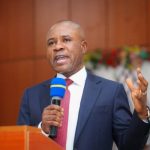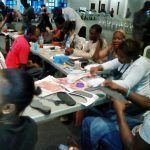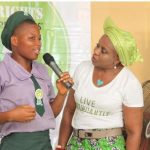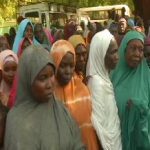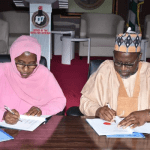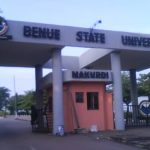The Federal Government says it is committed to ensuring the proper equipping of the Nomadic institution in the country.
This was stated by the Permanent Secretary, Federal Ministry of Humanitarian Affairs, Disaster Management and Social Development, Dr Nasir Sani-Gwarzo in Abuja, during the Submission of Concept Note by the Commission on Workshop for the Critiquing and Production of Training manuals for Nomadic Youth on Skills Acquisition and sustainable livelihoods.
De Sani-Gwaezo noted with optimism the Ministry’s interest in partnering with the National Commission for Nomadic Education (NCNE) in the training and empowerment of nomads in the country.
He said the Ministry and the Commission have a lot to do in the training and empowerment of nomads in the country and commended the effort of the Commission on the production of the training manuals.
He also emphasised the need for a stakeholder buy-in of the manual.
Dr Gwarzo revealed that the Commission has a Radio Station that could be used to air the activities and programmes of the Ministry to the remotest communities in the country.
He also acknowledged the presence of trained manpower in the commission that could be used to reduce banditry and insurgency.
He enjoined the commission to collaborate with the Ministry’s departments and agencies in relevant areas and called on the experts in the Nomadic Commission to work with the Ministry to have a plan of action, get a framework and a committee formed for a more positive result.
For his part, the Executive Secretary of the National Commission for Nomadic Education, Prof. Bashir H. Usman, said the delegation was there to seek partnership with the Ministry and Critique the training manual on nomadic education.
He said the Commission came into existence in 1989 for the education of Nomads, pastoralists, migrants and fish farmers.
According to him, there have been changes in their operation due to climate change and insecurity which made them review their laws in response to emerging issues.
In the same vein, the Director, Skill Development in the Commission, Dr Abdu Umar Ardo said that the Commission conducted a needs assessment with the pastoralists and the youth and came up with the need to train them on the following: Peace and Conflict Management; Modern Method of Cattle and Dairy production; Training the youth in ICT, phone repairs, POS, money transfer; Beekeeping; Fish farming and Entrepreneurship skills.
He expressed optimism that the Ministry will support the Commission in the area of funding to critique the training manual before usage so that they will know the methodology to use in the training.
He added that the training of the pastoralists is to bridge the gap in nomadic education, minimise youth restiveness, and the inclusion of nomads in the National Social Register for the attainment of Sustainable Development Goals in Nigeria.
The Federal Government says it is committed to ensuring the proper equipping of the Nomadic institution in the country.
This was stated by the Permanent Secretary, Federal Ministry of Humanitarian Affairs, Disaster Management and Social Development, Dr Nasir Sani-Gwarzo in Abuja, during the Submission of Concept Note by the Commission on Workshop for the Critiquing and Production of Training manuals for Nomadic Youth on Skills Acquisition and sustainable livelihoods.
De Sani-Gwaezo noted with optimism the Ministry’s interest in partnering with the National Commission for Nomadic Education (NCNE) in the training and empowerment of nomads in the country.
He said the Ministry and the Commission have a lot to do in the training and empowerment of nomads in the country and commended the effort of the Commission on the production of the training manuals.
He also emphasised the need for a stakeholder buy-in of the manual.
Dr Gwarzo revealed that the Commission has a Radio Station that could be used to air the activities and programmes of the Ministry to the remotest communities in the country.
He also acknowledged the presence of trained manpower in the commission that could be used to reduce banditry and insurgency.
He enjoined the commission to collaborate with the Ministry’s departments and agencies in relevant areas and called on the experts in the Nomadic Commission to work with the Ministry to have a plan of action, get a framework and a committee formed for a more positive result.
For his part, the Executive Secretary of the National Commission for Nomadic Education, Prof. Bashir H. Usman, said the delegation was there to seek partnership with the Ministry and Critique the training manual on nomadic education.
He said the Commission came into existence in 1989 for the education of Nomads, pastoralists, migrants and fish farmers.
According to him, there have been changes in their operation due to climate change and insecurity which made them review their laws in response to emerging issues.
In the same vein, the Director, Skill Development in the Commission, Dr Abdu Umar Ardo said that the Commission conducted a needs assessment with the pastoralists and the youth and came up with the need to train them on the following: Peace and Conflict Management; Modern Method of Cattle and Dairy production; Training the youth in ICT, phone repairs, POS, money transfer; Beekeeping; Fish farming and Entrepreneurship skills.
He expressed optimism that the Ministry will support the Commission in the area of funding to critique the training manual before usage so that they will know the methodology to use in the training.
He added that the training of the pastoralists is to bridge the gap in nomadic education, minimise youth restiveness, and the inclusion of nomads in the National Social Register for the attainment of Sustainable Development Goals in Nigeria.
The Federal Government says it is committed to ensuring the proper equipping of the Nomadic institution in the country.
This was stated by the Permanent Secretary, Federal Ministry of Humanitarian Affairs, Disaster Management and Social Development, Dr Nasir Sani-Gwarzo in Abuja, during the Submission of Concept Note by the Commission on Workshop for the Critiquing and Production of Training manuals for Nomadic Youth on Skills Acquisition and sustainable livelihoods.
De Sani-Gwaezo noted with optimism the Ministry’s interest in partnering with the National Commission for Nomadic Education (NCNE) in the training and empowerment of nomads in the country.
He said the Ministry and the Commission have a lot to do in the training and empowerment of nomads in the country and commended the effort of the Commission on the production of the training manuals.
He also emphasised the need for a stakeholder buy-in of the manual.
Dr Gwarzo revealed that the Commission has a Radio Station that could be used to air the activities and programmes of the Ministry to the remotest communities in the country.
He also acknowledged the presence of trained manpower in the commission that could be used to reduce banditry and insurgency.
He enjoined the commission to collaborate with the Ministry’s departments and agencies in relevant areas and called on the experts in the Nomadic Commission to work with the Ministry to have a plan of action, get a framework and a committee formed for a more positive result.
For his part, the Executive Secretary of the National Commission for Nomadic Education, Prof. Bashir H. Usman, said the delegation was there to seek partnership with the Ministry and Critique the training manual on nomadic education.
He said the Commission came into existence in 1989 for the education of Nomads, pastoralists, migrants and fish farmers.
According to him, there have been changes in their operation due to climate change and insecurity which made them review their laws in response to emerging issues.
In the same vein, the Director, Skill Development in the Commission, Dr Abdu Umar Ardo said that the Commission conducted a needs assessment with the pastoralists and the youth and came up with the need to train them on the following: Peace and Conflict Management; Modern Method of Cattle and Dairy production; Training the youth in ICT, phone repairs, POS, money transfer; Beekeeping; Fish farming and Entrepreneurship skills.
He expressed optimism that the Ministry will support the Commission in the area of funding to critique the training manual before usage so that they will know the methodology to use in the training.
He added that the training of the pastoralists is to bridge the gap in nomadic education, minimise youth restiveness, and the inclusion of nomads in the National Social Register for the attainment of Sustainable Development Goals in Nigeria.
The Federal Government says it is committed to ensuring the proper equipping of the Nomadic institution in the country.
This was stated by the Permanent Secretary, Federal Ministry of Humanitarian Affairs, Disaster Management and Social Development, Dr Nasir Sani-Gwarzo in Abuja, during the Submission of Concept Note by the Commission on Workshop for the Critiquing and Production of Training manuals for Nomadic Youth on Skills Acquisition and sustainable livelihoods.
De Sani-Gwaezo noted with optimism the Ministry’s interest in partnering with the National Commission for Nomadic Education (NCNE) in the training and empowerment of nomads in the country.
He said the Ministry and the Commission have a lot to do in the training and empowerment of nomads in the country and commended the effort of the Commission on the production of the training manuals.
He also emphasised the need for a stakeholder buy-in of the manual.
Dr Gwarzo revealed that the Commission has a Radio Station that could be used to air the activities and programmes of the Ministry to the remotest communities in the country.
He also acknowledged the presence of trained manpower in the commission that could be used to reduce banditry and insurgency.
He enjoined the commission to collaborate with the Ministry’s departments and agencies in relevant areas and called on the experts in the Nomadic Commission to work with the Ministry to have a plan of action, get a framework and a committee formed for a more positive result.
For his part, the Executive Secretary of the National Commission for Nomadic Education, Prof. Bashir H. Usman, said the delegation was there to seek partnership with the Ministry and Critique the training manual on nomadic education.
He said the Commission came into existence in 1989 for the education of Nomads, pastoralists, migrants and fish farmers.
According to him, there have been changes in their operation due to climate change and insecurity which made them review their laws in response to emerging issues.
In the same vein, the Director, Skill Development in the Commission, Dr Abdu Umar Ardo said that the Commission conducted a needs assessment with the pastoralists and the youth and came up with the need to train them on the following: Peace and Conflict Management; Modern Method of Cattle and Dairy production; Training the youth in ICT, phone repairs, POS, money transfer; Beekeeping; Fish farming and Entrepreneurship skills.
He expressed optimism that the Ministry will support the Commission in the area of funding to critique the training manual before usage so that they will know the methodology to use in the training.
He added that the training of the pastoralists is to bridge the gap in nomadic education, minimise youth restiveness, and the inclusion of nomads in the National Social Register for the attainment of Sustainable Development Goals in Nigeria.
The Federal Government says it is committed to ensuring the proper equipping of the Nomadic institution in the country.
This was stated by the Permanent Secretary, Federal Ministry of Humanitarian Affairs, Disaster Management and Social Development, Dr Nasir Sani-Gwarzo in Abuja, during the Submission of Concept Note by the Commission on Workshop for the Critiquing and Production of Training manuals for Nomadic Youth on Skills Acquisition and sustainable livelihoods.
De Sani-Gwaezo noted with optimism the Ministry’s interest in partnering with the National Commission for Nomadic Education (NCNE) in the training and empowerment of nomads in the country.
He said the Ministry and the Commission have a lot to do in the training and empowerment of nomads in the country and commended the effort of the Commission on the production of the training manuals.
He also emphasised the need for a stakeholder buy-in of the manual.
Dr Gwarzo revealed that the Commission has a Radio Station that could be used to air the activities and programmes of the Ministry to the remotest communities in the country.
He also acknowledged the presence of trained manpower in the commission that could be used to reduce banditry and insurgency.
He enjoined the commission to collaborate with the Ministry’s departments and agencies in relevant areas and called on the experts in the Nomadic Commission to work with the Ministry to have a plan of action, get a framework and a committee formed for a more positive result.
For his part, the Executive Secretary of the National Commission for Nomadic Education, Prof. Bashir H. Usman, said the delegation was there to seek partnership with the Ministry and Critique the training manual on nomadic education.
He said the Commission came into existence in 1989 for the education of Nomads, pastoralists, migrants and fish farmers.
According to him, there have been changes in their operation due to climate change and insecurity which made them review their laws in response to emerging issues.
In the same vein, the Director, Skill Development in the Commission, Dr Abdu Umar Ardo said that the Commission conducted a needs assessment with the pastoralists and the youth and came up with the need to train them on the following: Peace and Conflict Management; Modern Method of Cattle and Dairy production; Training the youth in ICT, phone repairs, POS, money transfer; Beekeeping; Fish farming and Entrepreneurship skills.
He expressed optimism that the Ministry will support the Commission in the area of funding to critique the training manual before usage so that they will know the methodology to use in the training.
He added that the training of the pastoralists is to bridge the gap in nomadic education, minimise youth restiveness, and the inclusion of nomads in the National Social Register for the attainment of Sustainable Development Goals in Nigeria.
The Federal Government says it is committed to ensuring the proper equipping of the Nomadic institution in the country.
This was stated by the Permanent Secretary, Federal Ministry of Humanitarian Affairs, Disaster Management and Social Development, Dr Nasir Sani-Gwarzo in Abuja, during the Submission of Concept Note by the Commission on Workshop for the Critiquing and Production of Training manuals for Nomadic Youth on Skills Acquisition and sustainable livelihoods.
De Sani-Gwaezo noted with optimism the Ministry’s interest in partnering with the National Commission for Nomadic Education (NCNE) in the training and empowerment of nomads in the country.
He said the Ministry and the Commission have a lot to do in the training and empowerment of nomads in the country and commended the effort of the Commission on the production of the training manuals.
He also emphasised the need for a stakeholder buy-in of the manual.
Dr Gwarzo revealed that the Commission has a Radio Station that could be used to air the activities and programmes of the Ministry to the remotest communities in the country.
He also acknowledged the presence of trained manpower in the commission that could be used to reduce banditry and insurgency.
He enjoined the commission to collaborate with the Ministry’s departments and agencies in relevant areas and called on the experts in the Nomadic Commission to work with the Ministry to have a plan of action, get a framework and a committee formed for a more positive result.
For his part, the Executive Secretary of the National Commission for Nomadic Education, Prof. Bashir H. Usman, said the delegation was there to seek partnership with the Ministry and Critique the training manual on nomadic education.
He said the Commission came into existence in 1989 for the education of Nomads, pastoralists, migrants and fish farmers.
According to him, there have been changes in their operation due to climate change and insecurity which made them review their laws in response to emerging issues.
In the same vein, the Director, Skill Development in the Commission, Dr Abdu Umar Ardo said that the Commission conducted a needs assessment with the pastoralists and the youth and came up with the need to train them on the following: Peace and Conflict Management; Modern Method of Cattle and Dairy production; Training the youth in ICT, phone repairs, POS, money transfer; Beekeeping; Fish farming and Entrepreneurship skills.
He expressed optimism that the Ministry will support the Commission in the area of funding to critique the training manual before usage so that they will know the methodology to use in the training.
He added that the training of the pastoralists is to bridge the gap in nomadic education, minimise youth restiveness, and the inclusion of nomads in the National Social Register for the attainment of Sustainable Development Goals in Nigeria.
The Federal Government says it is committed to ensuring the proper equipping of the Nomadic institution in the country.
This was stated by the Permanent Secretary, Federal Ministry of Humanitarian Affairs, Disaster Management and Social Development, Dr Nasir Sani-Gwarzo in Abuja, during the Submission of Concept Note by the Commission on Workshop for the Critiquing and Production of Training manuals for Nomadic Youth on Skills Acquisition and sustainable livelihoods.
De Sani-Gwaezo noted with optimism the Ministry’s interest in partnering with the National Commission for Nomadic Education (NCNE) in the training and empowerment of nomads in the country.
He said the Ministry and the Commission have a lot to do in the training and empowerment of nomads in the country and commended the effort of the Commission on the production of the training manuals.
He also emphasised the need for a stakeholder buy-in of the manual.
Dr Gwarzo revealed that the Commission has a Radio Station that could be used to air the activities and programmes of the Ministry to the remotest communities in the country.
He also acknowledged the presence of trained manpower in the commission that could be used to reduce banditry and insurgency.
He enjoined the commission to collaborate with the Ministry’s departments and agencies in relevant areas and called on the experts in the Nomadic Commission to work with the Ministry to have a plan of action, get a framework and a committee formed for a more positive result.
For his part, the Executive Secretary of the National Commission for Nomadic Education, Prof. Bashir H. Usman, said the delegation was there to seek partnership with the Ministry and Critique the training manual on nomadic education.
He said the Commission came into existence in 1989 for the education of Nomads, pastoralists, migrants and fish farmers.
According to him, there have been changes in their operation due to climate change and insecurity which made them review their laws in response to emerging issues.
In the same vein, the Director, Skill Development in the Commission, Dr Abdu Umar Ardo said that the Commission conducted a needs assessment with the pastoralists and the youth and came up with the need to train them on the following: Peace and Conflict Management; Modern Method of Cattle and Dairy production; Training the youth in ICT, phone repairs, POS, money transfer; Beekeeping; Fish farming and Entrepreneurship skills.
He expressed optimism that the Ministry will support the Commission in the area of funding to critique the training manual before usage so that they will know the methodology to use in the training.
He added that the training of the pastoralists is to bridge the gap in nomadic education, minimise youth restiveness, and the inclusion of nomads in the National Social Register for the attainment of Sustainable Development Goals in Nigeria.
The Federal Government says it is committed to ensuring the proper equipping of the Nomadic institution in the country.
This was stated by the Permanent Secretary, Federal Ministry of Humanitarian Affairs, Disaster Management and Social Development, Dr Nasir Sani-Gwarzo in Abuja, during the Submission of Concept Note by the Commission on Workshop for the Critiquing and Production of Training manuals for Nomadic Youth on Skills Acquisition and sustainable livelihoods.
De Sani-Gwaezo noted with optimism the Ministry’s interest in partnering with the National Commission for Nomadic Education (NCNE) in the training and empowerment of nomads in the country.
He said the Ministry and the Commission have a lot to do in the training and empowerment of nomads in the country and commended the effort of the Commission on the production of the training manuals.
He also emphasised the need for a stakeholder buy-in of the manual.
Dr Gwarzo revealed that the Commission has a Radio Station that could be used to air the activities and programmes of the Ministry to the remotest communities in the country.
He also acknowledged the presence of trained manpower in the commission that could be used to reduce banditry and insurgency.
He enjoined the commission to collaborate with the Ministry’s departments and agencies in relevant areas and called on the experts in the Nomadic Commission to work with the Ministry to have a plan of action, get a framework and a committee formed for a more positive result.
For his part, the Executive Secretary of the National Commission for Nomadic Education, Prof. Bashir H. Usman, said the delegation was there to seek partnership with the Ministry and Critique the training manual on nomadic education.
He said the Commission came into existence in 1989 for the education of Nomads, pastoralists, migrants and fish farmers.
According to him, there have been changes in their operation due to climate change and insecurity which made them review their laws in response to emerging issues.
In the same vein, the Director, Skill Development in the Commission, Dr Abdu Umar Ardo said that the Commission conducted a needs assessment with the pastoralists and the youth and came up with the need to train them on the following: Peace and Conflict Management; Modern Method of Cattle and Dairy production; Training the youth in ICT, phone repairs, POS, money transfer; Beekeeping; Fish farming and Entrepreneurship skills.
He expressed optimism that the Ministry will support the Commission in the area of funding to critique the training manual before usage so that they will know the methodology to use in the training.
He added that the training of the pastoralists is to bridge the gap in nomadic education, minimise youth restiveness, and the inclusion of nomads in the National Social Register for the attainment of Sustainable Development Goals in Nigeria.



